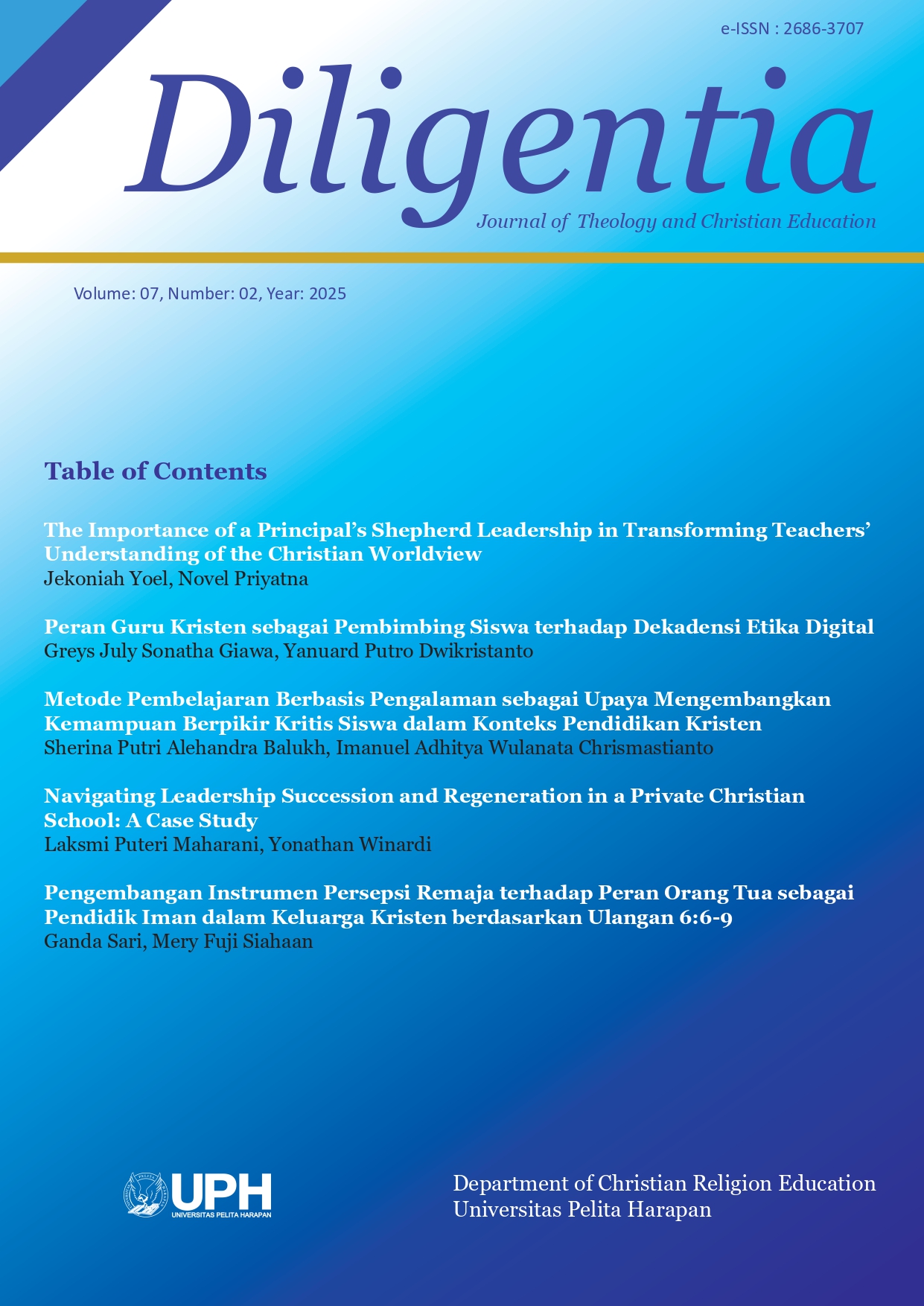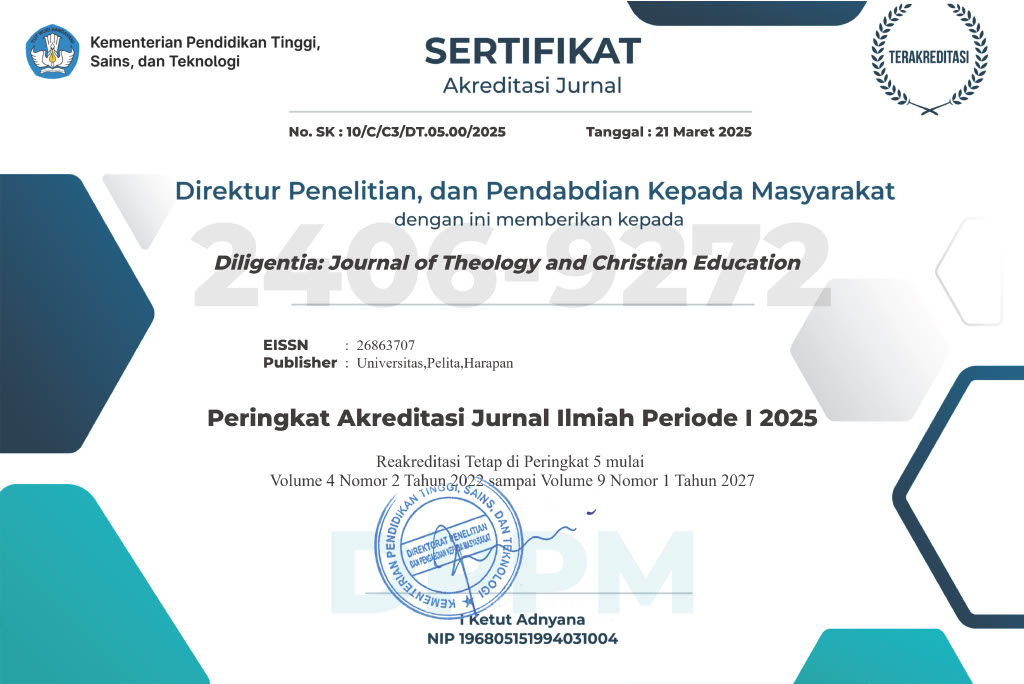Navigating Leadership Succession and Regeneration in a Private Christian School
A Case Study
DOI:
https://doi.org/10.19166/dil.v7i2.9721Keywords:
case study, Christian education, leadership succession, private Christian schoolAbstract
This study explores the complexity of leadership succession and regeneration in a private Christian school in West Jakarta and possible ways to navigate the challenges, as the school has experienced a high turnover rate in its leadership in the past five years. Using a qualitative case study approach, this research collected the data through in-depth interviews, observations, and document analysis. Principals as well as heads of schools participated and the research results revealed a discrepancy between the educational philosophy of Christian schools and the practices of leadership succession and regeneration, lacking a specific system or strategy. Moreover, there is no formal succession and inadequate spiritual mentoring for the school leader candidates. Therefore, considering that succession is also a spiritual mandate, this study offers a contextual and values-based pathway for leadership regeneration, which includes early-stage talent mapping, structured leadership development, spiritual mentorship, and alignment with the school’s Christian philosophy to ensure the continuity of biblically grounded leadership.
References
Ariawan, Sandy, Diana Situmeang, Peringatan Zebua, Kristyana, and Pangeran Guntar Wijaya Baringbing. “The Long and Winding Road of Christian Education Teachers in Fulfilling the Divine Vocation: Should You Run Away from Reality or Give Up with Circumstances?” Regula Fidei: Jurnal Pendidikan Agama Kristen 6, no. 2 (September 2021): 109–121. https://doi.org/10.33541/rfidei.v6i2.119.
Bartanen, Brendan, Jason A. Grissom, and Laura K. Rogers. “The Impacts of Principal Turnover.” Educational Evaluation and Policy Analysis 41, no. 3 (June 2019): 350–374. https://doi.org/10.3102/0162373719855044.
Barton, Andrew. “Preparing for Leadership Turnover in Christian Higher Education: Best Practices in Succession Planning.” Christian Higher Education 18, no. 1–2 (January 2019): 37–53. https://doi.org/10.1080/15363759.2018.1554353.
Bosch, David J. Transforming Mission: Paradigm Shifts in Theology of Mission. Maryknoll, NY: Orbis Books, 2011.
Bryk, Anthony S., Valerie E. Lee, and Peter B. Holland. Catholic Schools and the Common Good. Cambridge, MA: Harvard University Press, 1993.
Bush, Tony. Theories of Educational Leadership and Management. 4th ed. London: SAGE Publications, 2011.
Creswell, John W., and Cheryl N. Poth. Qualitative Inquiry and Research Design: Choosing Among Five Approaches. 4th ed. Thousand Oaks, CA: Sage Publications, 2018.
Darling-Hammond, L., Wechsler, M. E., Levin, S., Leung-Gagné, M., & Tozer, S. “Developing effective principals: What kind of learning matters?” [Report]. Learning Policy Institute. 2022. https://doi.org/10.54300/641.201.
Fullan, Michael. Leading in a Culture of Change. San Francisco, CA: Jossey-Bass, 2001.
Fusarelli, Bonnie C., and Lance D. Fusarelli. “Leadership for the Future: Enhancing Principal Preparation through Standards and Innovation.” Education Sciences 14, no. 12 (December 2024): 1–11. https://doi.org/10.3390/educsci14121403.
Greenleaf, Robert K. Servant Leadership: A Journey into the Nature of Legitimate Power and Greatness. 25th Anniversary ed. Mahwah, NJ: Paulist Press, 2002.
Groome, Thomas H. Educating for Life: A Spiritual Vision for Every Teacher and Parent. Allen, TX: Thomas More, 1998.
Grudem, Wayne. Business for the Glory of God: The Bible’s Teaching on the Moral Goodness of Business. Wheaton, IL: Crossway, 2012; Wilhoit, James C. Christian Education and the Search for Meaning. Grand Rapids, MI: Baker Book House, 1986.
Guthery, Sarah and Lauren P. Bailes. "Building Experience and Retention: The Influence of Principal Tenure on Teacher Retention Rates." Journal of Educational Administration 60, no. 4 (May 2022): 439–455. https://doi.org/10.1108/JEA-09-2021-0172.
Hukkinen, Esa, Johannes M. Luetz, and Tony Dowden. "Heutagogy as a Framework for Christian Discipleship: The Triadic Role of Biblical Wisdom Literature, the Teachings of Jesus Christ, and the Work of the Holy Spirit." Journal of Religious Education 73, no. 1 (September 2025): 95–114. https://doi.org/10.1007/s40839-024-00236-1.
Hollis, Deborah. "How Christian School Leadership Practices Impact the Creation of a School Environment Where Spiritual Nurture Can Occur in Students: A Phenomenological Investigation." EdD diss., Liberty University, 2019. https://digitalcommons.liberty.edu/doctoral/2025.
Kiersch, Christa, and Nicole Gullekson. “Developing Character-Based Leadership Through Guided Self-Reflection.” The International Journal of Management Education 19, no. 3 (November 2021), https://doi.org/10.1016/j.ijme.2021.100573.
Leithwood, Kenneth, Christopher Day, Pam Sammons, Alma Harris, and David Hopkins. Successful School Leadership: What It Is and How It Influences Pupil Learning. Nottingham, UK: National College for School Leadership, 2006.
Learning Policy Institute. “Developing Effective Principals: What Kind of Learning Matters?” Report. Last modified September 14, 2023. https://doi.org/10.54300/641.201.
Magezi, Vhumani, and Walter Madimutsa. “Character Formation and Leadership Development: A Symbiotic Bond for the Practice of Theological Education.” Theologia Viatorum 47, no. 1 (June 2023): 1-12. https://doi.org/10.4102/tv.v47i1.206.
Maxwell, John C. The 21 Irrefutable Laws of Leadership: Follow Them and People Will Follow You. Nashville, TN: Thomas Nelson, 2007.
Miller, Michael B. “Mentoring Spiritual Leaders: Discerning Effective Practices.” Doctor of Ministry diss., Asbury Theological Seminary, 2023.
Neal, Judith A. “Leadership and Spirituality in the Workplace.” In Handbook of the Psychology of Religion and Spirituality, edited by Raymond F. Paloutzian and Crystal L. Park, 419–32 New York: Guilford Press, 2006.
Nouwen, Henri J. M. In the Name of Jesus: Reflections on Christian Leadership. New York: Crossroad Publishing Company, 1989.
Porter, Steve L. “The Future of Christian Spiritual Formation.” Journal of Spiritual Formation and Soul Care 16, no. 1 (May 2023): 3–13. https://doi.org/10.1177/19397909231173908.
Purba, Eli Brigita, Elvan Vivian, and Merrick Jonathan. “A Theological Review of Strategic Human Resource Development Management for Christian Leadership.” KINAA: Jurnal Kepemimpinan Kristen dan Pemberdayaan Jemaat 5, no. 2 (December 2024): 79–92. https://kinaa.iakn-toraja.ac.id/index.php/ojsdatakinaa/article/view/173.
Quist, Allen H. “Leadership Succession from Matthew’s Gospel: Passing the Baton of Leadership to the Next Generation.” Great Commission Research Journal 1, no. 1 (Summer 2009): 50–57. https://place.asburyseminary.edu/gcrj/vol1/iss1/5/.
Sanou, Boubakar. “Leadership Development and Succession: A Review of Best Practices with Insights for Mission Leadership.” Journal of Applied Christian Leadership 15, no. 1 (Spring 2021): 28–53. https://digitalcommons.andrews.edu/jacl/vol15/iss1/5/.
Vanderbloemen, William, and Warren Bird. Next: Pastoral Succession That Works. Grand Rapids, MI: Baker Books, 2014.
Walker, Allan, and Clive Dimmock. “Leading the Multiethnic School: Research, Policy, Practice.” The Educational Forum 69, no. 3 (Spring 2005). https://doi.org/10.1080/00131720508984697.
Winardi, Yonathan, Oh Yen Nie, Wiputra Cendana, and Christina Dwi Putri. “Servant Leadership Informed by Christian Worldview: A Case Study in Lentera Harapan Schools.” In Proceedings of International Conference on Christian Education 2022, 211–219. Tangerang, Indonesia: Universitas Pelita Harapan, 2022.
Wise, Michael. “A Biblical Model for Leadership Succession.” Accessed April 20, 2025. National Academy of Engineering. https://www.nae.org/a-biblical-model-for-leadership-succession/.
Downloads
Published
How to Cite
Issue
Section
License
Copyright (c) 2025 Laksmi Maharani, Yonathan Winardi

This work is licensed under a Creative Commons Attribution-ShareAlike 4.0 International License.
Authors who publish with this journal agree to the following terms:
1) Authors retain copyright and grant the journal right of first publication with the work simultaneously licensed under a Creative Commons Attribution License (CC-BY-SA 4.0) that allows others to share the work with an acknowledgement of the work's authorship and initial publication in this journal.
2) Authors are able to enter into separate, additional contractual arrangements for the non-exclusive distribution of the journal's published version of the work (e.g., post it to an institutional repository or publish it in a book), with an acknowledgement of its initial publication in this journal.
3) Authors are permitted and encouraged to post their work online (e.g., in institutional repositories or on their website). The final published PDF should be used and bibliographic details that credit the publication in this journal should be included














